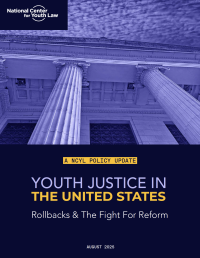Terry D. Lawsuit Prompts Major Reforms, Ends Practice of “Hog-Tying,” in Oklahoma’s Juvenile Institutions
In spring 1977, an attorney from Legal Aid of Western Oklahoma made an unannounced visit to one of the State’s secure juvenile institutions. What he found shocked him. Children were locked in solitary confinement cells for weeks, even months, on end. Some of the children “had been stripped to their underwear and given only a blanket.” They were at times denied access to the toilet. One 10-year-old child was sent to solitary confinement as punishment for running away. The attorney saw broken windows, exposed electrical wires, and leaking plumbing. “[T]he stench of human excrement and sweat pervaded the entire building[,]” he later told Congress.
In the fall of 1977, the attorney returned, this time with lawyers from NCYL. Subsequent investigations showed that incarcerated youth were routinely “hog-tied,” with their hands and feet shackled behind their backs and tied together with a strap or chain. Staff were drugging children without medical authorization. Experts called the educational program at one of the institutions “one of the worst educational systems” they had ever seen. Oklahoma’s own investigations substantiated reports of sexual relations between staff and youth, and of widespread instances of physical abuse.
Unlike almost every other state in the country, Oklahoma placed children from the dependency system, as well as those adjudicated delinquent, into its locked juvenile institutions. About half of the children in Oklahoma’s secure facilities were abused, neglected, or dependent “nonoffenders” or were children committed for “status offenses” such as truancy or running away from home.
On January 4, 1978, the plaintiffs brought suit in federal court, in Terry D. v. Rader, No. CIV-78-0004-T (W.D. Okla. 1978). NCYL joined the case as plaintiffs’ counsel in 1979. The District Court certified the case as a class action, and the plaintiffs filed multiple motions for preliminary injunctions. Before the court hearing on the motions, the defendants agreed to stop some of the most egregious practices. On November 2, 1982, the District Court entered an Interim Order, agreed to by the parties, that called for strict limitations on the use of solitary confinement, a complete prohibition on hog-tying, a ban on the use of mechanical restraints or shackles for punishment, and unannounced monthly fire safety and health and sanitation inspections.
Negotiations between the parties continued, and on May 31, 1984, the District Court agreed to enter a comprehensive consent decree. Years of court monitoring followed. On April 5, 1996, the court dismissed the action, contingent upon the defendants’ continued substantial compliance with the consent decree for a period of time. The court received the final monitoring report in February 1999. Federal court jurisdiction over the case continued until January 24, 2013, when the court approved a private settlement between the parties and unconditionally dismissed the action, with ongoing monitoring to be provided by plaintiffs’ counsel in Oklahoma.
Terry D. v. Rader is credited with having “set the stage for the subsequent restructuring of the Oklahoma juvenile justice system.” The lawsuit led to the closure of five of Oklahoma’s juvenile institutions and a substantial increase in community-based services. The number of confined youth in Oklahoma decreased from almost 1000 in 1978 to fewer than 200 by 1984, when the consent decree was entered. In the early 1980s, the Oklahoma Legislature passed landmark legislation reforming the juvenile justice system and codifying a number of the changes that had been court-ordered in Terry D.; many credited Terry D. v. Rader with creating the pressure needed for such large-scale statutory reform.
Over the years, the plaintiffs were represented by NCYL; Legal Aid of Western Oklahoma, Inc.; Oklahoma Disability Law Center; the Public Defender of Oklahoma County; the National Prison Project of the ACLU; and the law firm Frederic Dorwart Lawyers PLLC.





